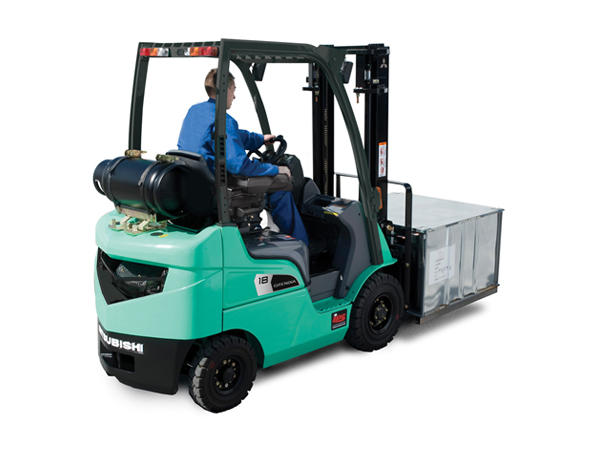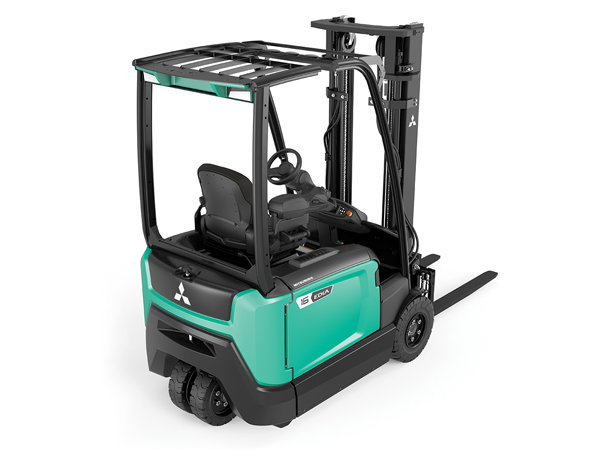Call Our Experts On:
LP gas forklifts, as the name would suggest, runs purely on liquified petroleum gas (LPG). Having long been a popular choice among the material handling industry, they have a competitive initial price and can also be used for both indoor and outdoor applications. Unlike electric forklifts, you’ll have many hours of uninterrupted service with an LPG forklift, as they won’t need charging in order to function.
Maintenance and running costs are also relatively affordable in comparison to diesel alternatives. Deriving from car engines, parts and components are exceptionally easy to source and cheap to buy, meaning you’ll be able to keep an LPG forklift running for many years, ensuring your business continues to thrive.
Maneuverability is also an important factor, as they’re far easier to operate than their diesel counterparts. Also unlike diesel machines, LPG forklifts are far quieter when in use and they don’t give off harmful emissions.
In summary, the advantages of LPG forklifts are as follows:
Together with the benefits associated with LPG forklifts, there are some other factors to consider if you’re thinking of purchasing one over an electric forklift. For example, where the machine itself is, initially, affordable to purchase, the fuel needed to power it could work out to be quite expensive over a period of time.
In addition to that, and much like diesel forklifts, an LPG machine will need to be regularly maintained, something that could take a hefty chunk of time out of your working day. As the cold weather sets in, these maintenance checks will need to become even more regular as parts and components can become brittle in freezing conditions.
When it comes to operating the forklift, you’ll only be given 5-20 seconds notice before the fuel runs out, meaning your forklift could cut out mid-operation. To avoid this, many warehouse owners look to hook up two gas tanks to the machine, although this can be an expensive way around the problem. This will also make the forklift more prone to leaks, which could cause slips, trips and falls in the workplace, as well as require more maintenance time on the vehicle itself.
In summary, some other factors to consider regarding the LPG forklift include:

Electric forklifts are ideal for those looking to keep their carbon footprint to an absolute minimum, as they’re the most eco-friendly option out there at the moment when it comes to material handling equipment. Being completely fume-free when in operation, an electric machine won’t give off any harmful emissions at all, making it perfect for indoor use.
Another reason why they’re great for indoor operations is because they’re incredibly quiet due to the weight of the machine and concentrated battery mass. But despite its hefty size, an electric forklift is quick and simple to maneuver, meaning you’ll be able to navigate tight corners and narrow aisles with absolute ease.
An electric forklift will also give many hours of service, especially if recharged overnight, ready for the next working day. In comparison to gas or diesel fuel, charging an electric forklift is far less costly – another reason why electric forklifts are exceptionally popular throughout the industry.
As there are less moving parts and heavy components needed in order for the machine to operate properly, they’re affordable to maintain and repair should something go wrong, especially when compared to maintenance costs associated with diesel alternatives.
In summary, the benefits of buying an electric forklift are as follows:
However, there are some factors you should think about before opting to purchase an electric forklift over an LPG machine. It’s important to note that initial costs might be slightly higher, unless you go for a second-hand alternative. The machine will also be out of use whilst it’s charging, so you may well need a back-up option on hand just in case the forklift needs a top-up during the course of the day.
You will also have to find some space to put the charging station, something some warehouse owners struggle with, especially if their warehouse is rather small. In addition to that, electric forklifts will find it difficult to navigate rough or loose terrain and so a relatively even surface will be needed for the most part in order to use the electric forklift to its full potential.
If you’re looking to use the forklift outside as well as indoors, then it’s important to consider the fact that an electric forklift shouldn’t be used in wet weather, particularly for long periods of time, given the nature of how it’s powered and the parts and components that are involved as a whole.
In summary, some other factors to consider regarding electric forklifts include:
Here at Charnwood Lift Trucks, we have a wide range of electric and LPG forklifts available, including new and used alternatives. We’re proud to be able to supply our customers with high-quality machinery every single time. Regardless of your budget, we’ll work tirelessly to ensure your needs are met.
For more information about the forklifts we have on offer, including new and used diesel machines, get in touch with a member of our friendly, knowledgeable team today – we’re always happy to impart specialist advice and guidance when you need it most.

Charnwood Lift Truck Services are one of the leading Mitsubishi Forklift dealers operating in the Midlands.
If you have any questions about our products and services please contact us.
